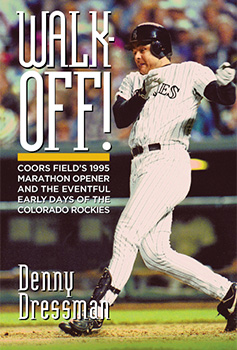
Walk-Off!: Coors Field's 1995 Marathon Opener and the Eventful Early Days of the Colorado Rockies
April 26, 1995
“Opening Days are interesting because you feel like you’re 12 years old again. The butterflies are really there. They’re big-time in your stomach. That game was a blast.”
—Dante Bichette,
Colorado Rockies
IT HAD SNOWED OVERNIGHT, raising serious doubts in the morning whether or not the game would be played. The late-April blanket of white had required a gargantuan effort to make the field playable and the stands hospitable to the anticipated sellout crowd.
It was cold. From 42 degrees at game time, the temperature had fallen into the mid-30s. The wind chill, which began the evening at 38, had dropped to 30.
And, it was getting late. First pitch was at 5:38 p.m., but after 115 batters, 14 pitchers and 423 pitches, it was nearly 10:30.
The game was in extra innings, as dramatic as a “first game” could possibly be, when one man’s wife, somewhere around the 12th, told him: “We need to leave after this inning. I’m cold.”
“You don’t understand,” her husband replied. “We can’t LEAVE. We’re seeing history made.”
In fact, as John Mossman of The Associated Press wrote, “Wednesday night marked the longest debut game for any big-league ballpark used (in the 20th) century.”
“The first may be the best forever,” wrote sports columnist Woody Paige in the next morning’s Denver Post. (The Wild Card tiebreaker game against San Diego 12 years later topped it, at least in the opinion of Rockies head groundskeeper Mark Razum, but then again . . . )
“It was like a full season in one game,” Dante Bichette, the starting left fielder, said years later, “because so much happened . . . back and forth . . . up and down . . . The game sparked a team that was never out of it. No lead was safe against that team, in that park. It was a fun time.”
Bichette’s “fun time” was the official opening of Coors Field, the baseball-only stadium that transformed Denver’s decrepit Lower Downtown, with its empty warehouses and vacant lots, into chic LoDo, awash in restaurants, bars, lofts and, by 2021, the magnificent McGregor Square complex, across 20th Street from Coors Field.
The future Hall-of-Famer, Larry Walker, was making his Rockies debut—impressively, memorably. And replacement umpires stood at the bases and behind home plate, calling balls and strikes, fair or foul, safe or out.
The New York Mets and Colorado Rockies had tied the score four times—once on a grand slam and twice on last-out hits. Runs had been scored in seven of the first nine innings, including in each half of the ninth. After three uneventful extra innings, both teams scored in the 13th—and again in the 14th, finally deciding it in dramatic fashion—as no one could do better than the fist-pumping Bichette.
“Lo-Do Magic” had not yet entered Denver’s baseball lexicon. But it was born that frigid night. So, too, the “Blake Street Bombers” and “No lead is safe at Coors Field” had their beginnings in the chill.
Delayed almost a month by the continuation of a players strike that halted the previous season in August, canceled the 1994 World Series and began the eventual demise of the Montreal Expos, Opening Night at Coors Field—the first official Major League game played in Denver’s new baseball-only stadium—was the conclusion to years that served as prelude, including two seasons of baseball games in a football stadium. What followed, was a dramatic, historic, exhilarating sequel.
It would mark the beginning of an improbable season that saw an expansion team, in only its third year of existence, win the first National League Wild Card berth in baseball’s newly expanded playoffs—under the leadership of a former star whose first-ever managerial experience came with this team. He would be recognized as the best among his new peers that season, as National League manager of the year.
When it finally ended, sportscaster Jon Miller, on ESPN, said: “This is a game they’ll never forget in Denver.”
What a game. What a year. What a story.
To appreciate it fully, we need to put the game in context, beginning with the long struggle to bring Major League Baseball to mile-high Denver
Purchase Book